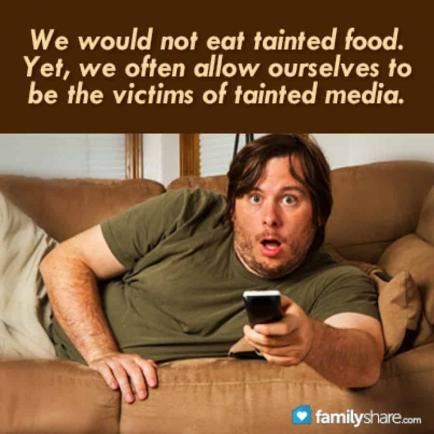
We often hear the saying, "you are what you eat."� The food we eat is processed and stored for use in various ways. Some food is healthy for us and some is harmful. Likewise, the information we gather in our minds is processed, stored, and manifest in our behavior and in the way we view the world. The information we gather daily can enlighten us and help us to grow, or it can damage and distort.
Continuous exposure to unhealthy media can damage our minds just as the habit of eating unhealthy food can damage our bodies.We maintain a steady diet of food for our minds in the form of magazines, books, music, television, movies, and the Internet. Our minds are like computer hard drives, storing all input. We can become desensitized to harmful content and sometimes even become addicted to it.
Harmful information in visual images, music, or printed text bombards us everywhere. It can come at any time: during a commercial on our television or even while walking through the mall. The last time I walked through a mall, I noticed how increasingly racy the displays have become outside a lingerie store. I had the thought, What does a child walking through the mall think when he or she sees that? What impression does it give? And is it appropriate for her age?
Like static, media maintains a steady numbing noise, creating tunnel vision, filtering out more subtle communication, and distracting us from our course. Whenever we are within its grasp, we are being acted upon. We mentally interact with the material, but it is the author of the material that directs the play on the stage of our mind. It is important that we act and are not acted upon.
We need to choose what we see and what we interact with in order to protect ourselves and our families.
Avoid exposure in the first place. Establish standards or guidelines within the home and expectations for outside the home.
Remember the following tips for a healthy family attitude toward degrading media:
Discussion
- Be open about the subject with your children. Express your concerns and allow feedback. Determine what media is appropriate and not appropriate. Knowing what to do in advance will go a long way to determining an action when a choice presents itself.
Example
- Establish behavior by example - If you want your children to avoid something, they must know that you do the same.
Protection
- "Parental controls"� can often be viewed as restrictions. Explain that they are protection, not restrictions. Keep computers and televisions in public places within your home. Use programs that block inappropriate material. However, computer savvy children can find ways to bypass these programs. Check in frequently, asking your child whether they've come across anything degrading, and looking through your computer's history to double-check.
What should you do when you are exposed to degrading media?
It is not possible to completely avoid exposure to inappropriate material because it is everywhere. Have the courage to turn off, close the page on, or walk out on something you consider inappropriate. Again, a healthy home atmosphere, with standards established, will give strength and direction to your whole family in avoiding degrading media.

